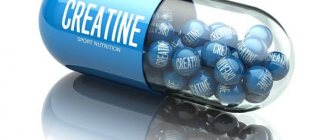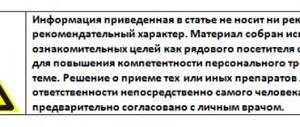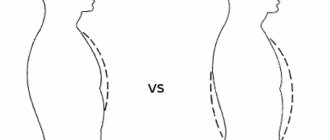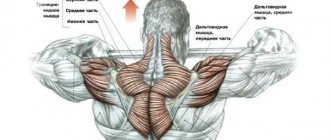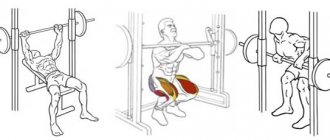Nutrition and dietSports nutrition
Everything you want to know about creatine monohydrate: what it is, how to take it, is it right for you personally, what are the benefits of taking creatine monohydrate and much more.
Creatine monohydrate is one of the most popular supplements in the world for people seeking to gain muscle mass, increase physical performance and increase strength. According to research, more than 40% of National College Athletic Association (NCAA) athletes say they take creatine.
Of all the existing sports supplements, creatine has received the most scientific research. Despite this, you still hear a lot of misinformation about this nutrient both on the Internet and in gyms. This short guide contains proven facts about creatine monohydrate and answers to all your questions.
If after reading the article you have any questions regarding creatine monohydrate, please voice them in the comments.
What is creatine monohydrate?
Creatine monohydrate is a naturally occurring organic compound that is converted into creatine phosphate in the body. Creatine phosphate promotes the synthesis of the energy substrate adenosine triphosphate (ATP). It is ATP that provides energy for muscle contractions and other intracellular processes.
The human body can synthesize a small amount of creatine on its own; some of the nutrient comes from food, in particular red meat and fatty fish. However, the carnitine content of food can be significantly reduced during cooking and cooking.
Creatine monohydrate supplements are products that contain the purest form of creatine; athletes often take them before and after training and/or along with other drugs, such as whey protein.
Glycogen preservation
Glycogen is a glycan, the basis of which is glucose residues in the body. Simply put, it is one of the main sources of energy for an athlete's muscle cells. The only disadvantage of glycogen is that its supply is limited, and it is depleted relatively quickly during training.
Previously, only theory and guesswork stated that supplements containing creatine significantly slow down the depletion of glycogen reserves (depending on the amount of creatine in the composition). Now this assumption has been confirmed by science. Thus, it was established as a result of Brazilian studies and experiments: creatine plays the role of an additional supplier of energy units to the body. The process of inhibiting glycogen loss occurs in both muscles and liver.
This effect is great for athletes who are looking to push the limits of their endurance. It is because of this that creatine is recommended to be used not only by bodybuilders, but also by football players, runners, wrestlers, fighters, crossfitters, basketball players and representatives of other sports where aerobic exercise occurs.
As for bodybuilding, everything is a little more complicated. There are stages of bodybuilder training in which the end result is the complete depletion of glycogen from its reserves. In this case, creatine is excluded from the supplement complex.
How does creatine monohydrate work?
To understand how creatine monohydrate works, you must first learn about ATP and its physiological function. ATP is a universal source of instant energy for muscle contraction. The ATP contained in muscle fibers is only enough for a couple of contractions; additional ATP must come from the body’s “reserves”. Creatine monohydrate is converted into creatine phosphate and replenishes strategic ATP reserves.
But what does this mean in practice? With unlimited access to ATP reserves, you can increase your weight and perform more reps. For maximum physical performance, muscles need sources of “fast” energy, and creatine provides them with this energy in full. You've probably heard of this as "explosive energy."
What is the best way to take creatine?
While the benefits of taking supplements are an open question, many are looking to maximize their effects.
Researchers have tried combining other ingredients with supplements, including protein, carbohydrates, amino acids, cinnamon and other plant-based ingredients, to increase their effectiveness.
Some studies show that consuming creatine with carbohydrates increases the maximum amount of creatine that can be absorbed into the muscles.
Other studies, however, show that adding carbohydrates does not produce significant training benefits.
Moreover, some studies use a dosage of almost 100 grams of carbohydrates, or about 400 calories.
If you don't need those extra calories, excess can lead to weight gain.
Overall, there may be benefits to taking both supplements and carbohydrates, but too many carbohydrates puts you at risk of consuming too many calories.
The most practical strategy would be to take creatine when you eat your regular carbohydrate-containing meals, but not take any excess carbohydrates beyond your regular diet.
It's also a good idea to take some protein with this meal, since protein and amino acids increase the amount of creatine your body can absorb.
Sometimes other ingredients are taken along with creatine to increase its effectiveness. Carbohydrates can help with this, and it is best to take creatine with a meal containing carbohydrates and protein.
Beneficial properties of creatine monohydrate
Now that you understand how creatine monohydrate works, you can probably already see how taking this nutrient can benefit you. Below we list the benefits of creatine for those who practice high-intensity training (strength training) or engage in sports that require a colossal amount of instant energy (for example, sprinting).
- Increases muscle mass and strength
- Increases energy reserves of skeletal muscles
- Boosts energy production (more sets and reps)
- Promotes muscle gain
- Accelerates recovery after training
Creatine
Optimum Nutrition Micronized Creatine Powder
Pure creatine monohydrate. Increases strength and accelerates muscle growth!
Twinlab Creatine Fuel Caps
Energy replenishment of muscles. Increasing physical performance and endurance during training!
Optimum Nutrition Creatine 2500 Caps
Pure creatine monohydrate. Increasing endurance and training efficiency!
MusclePharm Creatine
Blend of five types of creatine. Stimulates muscle growth to create a strong, defined physique!
Universal Nutrition Creatine
Maintaining a stable level of ATP in muscle tissue. Incredible gains in muscle strength and performance!!
Dymatize Creatine Micronized
Micronized creatine! Increases muscle strength, volume and intensity of exercise, accelerates recovery.
Gaspari Nutrition Qualitine
Micronized and instantly dissolving creatine! The highest quality standard of creatine monohydrate in sports nutrition/
MHP Creatine Monohydrate
Helps increase muscle mass and strength! Mixes easily and instantly!
Muscle hypertrophy
Despite the fact that many laboratory studies have been conducted with creatine, the study of the beneficial properties of this acid does not stop. After several experiments, the main effect on the organic resource was revealed - increasing the endurance of muscle cells by reducing the glycogen content in them.
Recently, after a series of experiments, it was found that creatine improves the production of a protein of fibrillar structure - myosin. This element, in turn, stands alongside the main components of myofibrils - contractile muscle tissue. These are precisely the fibers that take the main part in performing various types of exercises in iron sports, since they squeeze and pull weights.
The results of the research became sensational in certain circles. Not stopping there, several more analyzes were done. With their help, it was established that in a short period of use creatine acid can have a positive effect on the body of people who are prone to rapid muscle loss.
The natural and first explanation for the increase in muscle mass (hypertrophy) is the fact that creatine is able to flood it. But, as it turned out, in addition to water retention, after a short course of taking the supplement, they found a general expansion of muscle fiber - not only due to an increase in energy sarcoplasm.
To date, it has been successfully proven that creatine slows down the process of protein destruction in the athlete’s body.
How to take creatine monohydrate?
The recommended dosage regimen for creatine monohydrate is 3-5 grams per day. There is no consolidated opinion regarding the optimal time of administration. Many people mix creatine with other nutritional supplements, such as whey protein, or creatine can be diluted in warm water (this improves solubility), fruit juice or decaffeinated tea. It should be noted that creatine monohydrate must be prepared immediately before use, and creatine powder cannot be diluted in advance.
Long-term scientific studies of creatine monohydrate have not been conducted, and therefore it is usually recommended to take it in courses. For example, the period of taking creatine monohydrate can be 8 weeks followed by a break of 4 weeks.
Is there a difference in the time of taking powder and capsules?
The emergence and widespread distribution of the capsule form of the supplement raised many questions from athletes. Doubts arose regarding the differences in the method and rules for taking the product in 2 different forms.
In practice, there are practically no differences in use. Creatine in capsule and powder form is an identical substance, which in the second case is placed in a gelatin shell. The only difference is the addition of additional ingredients to the capsule form (for example, an active substance with an improved transport system). In other options, there can be no difference between taking supplements - capsules are a convenient option for use on the go, without dissolving in liquid.
Options for proven supplements in capsules and powder:
Optimum Nutrition, Creatine 2500 Capsules, 100 Capsules
Price – RUB 1,226.57
Buy from a partner
Muscletech, Essential Series, Platinum 100%, Creatine, Unflavored, 14.11 oz (400 g)
Price – ₽1,300.11
Buy from a partner
The only nuance in taking capsules is calculating the correct dosage. To do this, you should specify in the manufacturer’s description the specific content of the substance in one capsule, and not just its weight.
Side effects
In general, creatine monohydrate is safe, especially when following the recommended dosage regimen, but remember that the rule of thumb with creatine is “less is more.” Increasing the dosage does not mean that the effectiveness of the drug will also increase. Once you replenish your ATP supply, the excess creatine begins to be eliminated (wasted) from the body. And since creatine attracts interstitial fluid into muscle cells, it is important to drink enough water while taking the drug.
People under 18 years of age are not recommended to take creatine. This is explained by the lack of research examining the effects of creatine on the teenage body.
Popular myths
To understand what creatine is and why it is needed in bodybuilding, you should know some reliable facts about this dietary supplement:
- The powder is practically insoluble in water for several days and does not dissolve in the stomach.
- Well absorbed by the body. Its main part is absorbed by muscle tissue without changing shape.
- Creatine prevents water from leaving the body.
- Monohydrate is the most beneficial and effective form.
- There is no scientific evidence regarding negative effects on the body.
We should also add that creatine is useful for weight loss. To achieve the desired effect when using creatine for weight loss, you must strictly adhere to the diet and consumption standards. The drug saturates the body with energy, which allows you to train hard, consuming extra calories. Fat is also lost due to increased testosterone levels. However, in some cases, the supplement may slow down the fat burning process.
FAQ
Is Creatine Loading Necessary?
When creatine monohydrate first began to gain popularity, many sports nutrition manufacturers recommended using a creatine “load” for 5-7 days to flood the muscles with the nutrient and accelerate gains. However, this technique has not been confirmed in scientific works, and today most manufacturers recommend simply taking 3-5 grams of creatine on a daily basis.
What is Creapure® Creatine Monohydrate?
In the sports nutrition industry, Creapure® is considered the “gold standard” of creatine monohydrate preparations. Creapure® is a brand-name creatine monohydrate manufactured in Germany and found in hundreds of creatine products sold worldwide. To find out if your powder or capsules contain Creapure® creatine monohydrate, simply look for the Creapure® label on the product label.
What is micronized creatine monohydrate?
As the name suggests, micronized creatine monohydrate is regular creatine monohydrate powder that has been micronized. Micronization is the process of grinding powder into microscopic particles, the size of which is 20 times smaller than in standard powders. In this form, creatine dissolves much faster in liquids and, in theory, is more easily absorbed by the body. If you have ever used non-micronized creatine, then you know that after diluting the product, a large number of small grains of sand can remain at the bottom of the glass. This is creatine that has not dissolved, and this creatine should be in your body, not at the bottom of the glass.
Today, most creatine supplements contain micronized creatine. We recommend that you always use a micronized product for maximum effectiveness.
Does caffeine affect the effectiveness of creatine monohydrate?
In relation to Creapure, a product of one of the most reputable manufacturers of creatine monohydrate in Germany, high doses of caffeine may negatively affect the effectiveness of creatine in increasing physical performance. However, lower doses of caffeine found in coffee and pre-workout powders work well with creatine. Here is the information from the manufacturer's official website:
“Taking high doses of caffeine (5 mg per kilogram of body weight per day) neutralizes the ergogenic (performance enhancing) effect of creatine. On the other hand, low doses of caffeine (eg, 1-2 cups of coffee per day) did not have a negative effect on the effectiveness of creatine.
Creatine and insulin
Any experienced bodybuilder knows many ways to dilute a creatine supplement to enhance its performance. Eg:
- dilution with grape or cherry juice;
- juice with high insulin levels.
The main goal of such creatine dilution regimens is to deliver the maximum possible amount of insulin into the blood. Everything seems simple, but not everything simple turns out to be brilliant. This is where the error lies.
The whole point is that creatine has a hidden property that not everyone knows about - partial blocking of insulin entering the circulatory system. And he does this, believe me, “conscientiously.” Here is the conclusion: there will always be not enough insulin to eliminate creatine in the blood. The only trick that can work in this situation is to use insulin injections 30 minutes before taking the next portion of creatine.
By the way, insulin is a peptide hormone that is involved in all kinds of metabolism in the human body. Its main advantages for an athlete are:
- suppression of blood glucose levels;
- anabolic effect (increases protein synthesis, production of fatty acids, etc.);
- anti-catabolic effect (slows down the breakdown of proteins, blocks the release of fatty acids into the blood).
